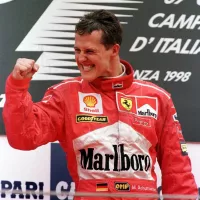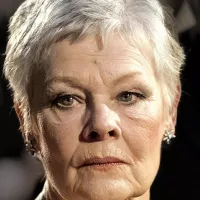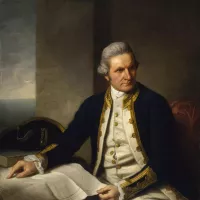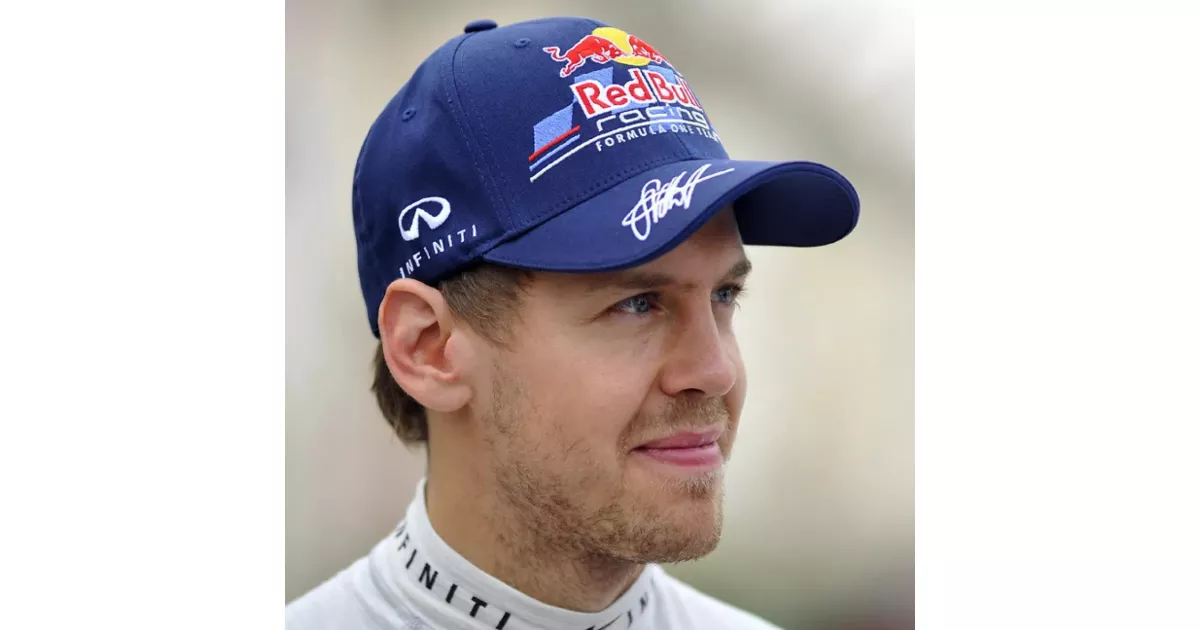Sebastian Vettel, a highly acclaimed German Formula One driver, competed from 2007 to 2022, representing renowned teams like BMW Sauber, Toro Rosso, Red Bull, Ferrari, and Aston Martin. Vettel's illustrious career includes four consecutive World Drivers' Championship titles from 2010 to 2013 with Red Bull, a feat that solidified his place as one of the sport's most triumphant figures. Holding the record for the youngest-ever World Champion, Vettel also boasts an impressive track record with the fourth-highest number of race victories (53), third-highest podium finishes (122), and fourth-highest pole positions (57) in Formula One history.
1980: Vettel's Challenging Season with Ferrari
Ferrari had a disappointing season in 1980, finishing sixth in the Constructors' standings, their worst result since that year.
July 1987: Birth of Sebastian Vettel
Sebastian Vettel was born in Heppenheim, West Germany in July 1987.
1995: Start of Karting Career
Vettel's passion for racing began at the age of three, and he started racing karts in 1995.
1998: Joining the Red Bull Junior Team
Vettel's talent was recognized early, and he joined the Red Bull Junior Team in 1998.
2001: Schumacher's Triumph at Monaco
Michael Schumacher secured victory for Ferrari at the Monaco Grand Prix in 2001, marking a significant moment for the team.
2001: Winning the Junior Monaco Kart Cup
Vettel's success in karting continued as he won the Junior Monaco Kart Cup in 2001.
2003: Transition to Open-Wheel Racing
Vettel transitioned from karting to open-wheel racing in 2003.
2004: Winning the Formula BMW ADAC Championship
Vettel's dominance in open-wheel racing was evident when he won the 2004 Formula BMW ADAC championship.
2005: Formula 3 Euro Series and Testing for Williams
Vettel raced in the 2005 Formula 3 Euro Series and tested for the Williams Formula One team.
2006: Test Driver, Formula 3, and Formula Renault 3.5 Series
Vettel continued as a test driver for BMW Sauber in 2006 while participating in the Formula 3 Euro Series and Formula Renault 3.5 Series.
2006: Third Driver for BMW Sauber and Testing Debut
Vettel served as BMW Sauber's third driver at the 2006 Turkish Grand Prix and set the fastest time in practice sessions.
2006: Test Driver for BMW Sauber
Vettel's Formula One journey began as a test driver for BMW Sauber in 2006.
July 2007: Joining Scuderia Toro Rosso
Vettel was released by BMW in July 2007 and joined Scuderia Toro Rosso.
2007: One-Off Race and Move to Toro Rosso
After a one-off race with BMW Sauber, Vettel joined Scuderia Toro Rosso in 2007.
2007: Test Driver and Replacement for Kubica
Vettel continued as BMW's test driver in 2007 and replaced the injured Robert Kubica at the United States Grand Prix.
2007: Formula One Debut
Vettel made his Formula One debut with BMW Sauber in 2007.
2007: Vettel's Race of Champions Debut and Nations' Cup Victory
Vettel made his Race of Champions debut in 2007, representing Germany alongside Michael Schumacher. They won the Nations' Cup title together.
2007: Formula Renault 3.5 Series and Call to Formula One
Vettel started 2007 in the Formula Renault 3.5 Series and was called up to Formula One by BMW Sauber.
2008: Ferrari's Dominant Performance at the French Grand Prix
Ferrari displayed their dominance at the 2008 French Grand Prix, securing a front-row lockout with their drivers.
2008: Vettel Earns "Baby Schumi" Nickname
Following his unexpected victory at the 2008 Italian Grand Prix, Vettel was dubbed "Baby Schumi" by the media. This nickname was attributed to his nationality, driving style, focus, and close collaboration with his engineering team, drawing comparisons to Michael Schumacher. Vettel, however, downplayed the comparison, expressing his desire to be recognized as the "New Vettel".
2008: Vettel's First Monza Win
In 2008, Sebastian Vettel experienced his first win at Monza driving a car powered by a Ferrari engine. This event fueled his desire to one day drive for the iconic Ferrari team.
2008: Vettel's Helmet Design Evolution
In 2008, Vettel's helmet design started incorporating the red cross shape of the Kreis Bergstraße coat of arms, representing his birthplace, Heppenheim.
2008: Vettel Awarded Rookie of the Year
Sebastian Vettel was named Rookie of the Year at the 2008 Autosport Awards.
2008: Vettel and Schumacher's Race of Champions Dominance Begins
Vettel and Schumacher teamed up again for the 2008 Race of Champions, marking the start of their four consecutive Nations' Cup victories together.
2008: First Grand Prix Victory and Full-Time Driver for Toro Rosso
Vettel became the then-youngest race winner at the Italian Grand Prix in 2008 while driving for Toro Rosso.
2008: Vettel Starts Naming His Cars
Vettel began his tradition of naming his cars in 2008, starting with "Julie" for his Toro Rosso STR3. He explained his reasoning, stating, "It's important to have a close relationship with a car. Like a ship, a car should be named after a girl as it's sexy".
2008: Full-Time Driver for Toro Rosso Alongside Sébastien Bourdais
Vettel drove for Toro Rosso in 2008 alongside Sébastien Bourdais.
2008: Breakthough Performance at the European Grand Prix
Vettel's performance improved significantly at the 2008 European Grand Prix in Valencia.
2009: Red Bull Racing Debut and Early Success
In 2009, Sebastian Vettel joined Red Bull Racing, replacing the retired David Coulthard. He started strong, securing a second-place finish in the Australian Grand Prix before a late-race collision with Robert Kubica. Vettel achieved his first win with Red Bull Racing at the Chinese Grand Prix, marking the team's first-ever pole and win.
2009: Vettel Receives Lorenzo Bandini Trophy and BRDC Award
In 2009, Sebastian Vettel received the Lorenzo Bandini Trophy for his achievements in 2008 and the British Racing Drivers' Club Johnny Wakefield Trophy for setting the fastest race lap at Silverstone. He was also voted Formula One driver of the year by team principals and won the DHL Fastest Lap Award.
2009: Vettel Continues Naming Tradition
Vettel continues his tradition of naming his cars, using "Kate" and "Kate's Dirty Sister" for his 2009 cars.
2009: Promotion to Red Bull Racing
Vettel was promoted to Red Bull Racing in 2009.
2009: Vettel's Varied Helmet Designs with Red Bull
Vettel's helmet designs became more diverse after joining Red Bull in 2009, ranging from subtle variations of the Red Bull logo to completely new themes.
2009: Continued Success and Championship Runner-Up
Vettel's strong performance continued throughout 2009 with victories in Great Britain, Japan, and Abu Dhabi. His win at the Japanese Grand Prix was particularly dominant, starting from pole position and leading every lap. Vettel's success culminated in a second-place finish in the World Drivers' Championship standings, trailing behind Jenson Button. He also earned the 2009 DHL Fastest Lap Award for having the most second-fastest laps.
2010: Vettel Crowned Champion, Addresses Schumacher Comparisons
After clinching his first championship title in 2010, Vettel, often hailed as the "Next Schumacher," acknowledged the difficulty of achieving even one championship and expressed his desire to win more while downplaying comparisons to Schumacher's records.
2010: Vettel's Special Helmet for Japanese Grand Prix
At the 2010 Japanese Grand Prix, Vettel sported a unique white-red helmet design featuring Japanese kanji and hiragana for "gives you wings".
2010: Early Success and Leadership Role
Sebastian Vettel kicked off the 2010 season by securing the first pole position at the Bahrain Grand Prix, although a spark plug failure resulted in a fourth-place finish. At the Australian Grand Prix, Vettel was appointed as a director of the Grand Prix Drivers' Association and he clinched his first victory of the season in Malaysia.
2010: Vettel Named German Sportspersonality and European Sportsperson of the Year
Sebastian Vettel was voted German Sportspersonality of the Year and won the Autosport International Racing Driver Award in 2010. He was also named European Sportsperson of the Year by the International Sports Press Association.
2010: First World Championship Title
Sebastian Vettel won his first Formula One World Championship title in 2010 with Red Bull.
2010: Vettel Names Cars "Luscious Liz" and "Randy Mandy"
Vettel's 2010 cars were given the names "Luscious Liz" and "Randy Mandy", continuing his tradition.
2011: Vettel Impresses Pirelli Director
Paul Hembery, Pirelli's director, was impressed by Vettel's dedication when he became the only driver besides Michael Schumacher to visit Pirelli's factory and engage in discussions to gain a deeper understanding of their tires.
2011: Technical Regulations and Team Orders Controversy
The 2011 European Grand Prix saw the FIA implement a ban on engine mappings, believed by some to target Vettel's dominance. Despite this, Vettel secured pole position with a record-breaking qualifying lap in Valencia and went on to win the race, his sixth victory in eight races. At the British Grand Prix, further FIA rule changes impacted Red Bull, but Vettel still managed a second-place finish, ignoring team orders to hold position behind Webber, leading to tension within the team.
2011: Voice Acting in Cars 2
Vettel lent his voice to the character Sebastian Schnell in the German version of Cars 2 in 2011.
2011: Dominant Start and Technical Challenges
Vettel started 2011 with consecutive victories in Australia and Malaysia. The Chinese Grand Prix saw him finish second due to tire management issues, possibly stemming from communication problems caused by a broken radio. In Monaco, a radio malfunction led to a slow pit stop and incorrect tire selection, but Vettel managed to recover and win the race.
2011: Vettel Wins Formula One Driver of the Year
Vettel was voted Formula One driver of the year in 2011 by team principals.
2011: Vettel Names Car "Kinky Kylie"
Vettel's car for 2011 was named "Kinky Kylie", sticking with his tradition.
January 2012: Vettel Honored with Grands Prix de l'Academie des Sports
Sebastian Vettel received the Grands Prix de l'Academie des Sports in January 2012.
October 2012: Vettel Honors Felix Baumgartner with Helmet Design
For the start of the 2013 season, Vettel's helmet design paid tribute to Felix Baumgartner's world record Red Bull Stratos space jump in October 2012.
2012: Vettel Names Car "Abbey"
Continuing his tradition, Vettel named his 2012 car "Abbey".
2012: Release of the Infiniti FX Sebastian Vettel Edition
Red Bull Racing sponsor Infiniti released a special edition Infiniti FX SUV in 2012 to honor Sebastian Vettel, featuring enhanced performance and design elements.
2012: Vettel and Schumacher's Continued Success
Vettel and Schumacher continued their Race of Champions dominance in 2012, winning their fourth consecutive Nations' Cup title together.
2012: A Season of Ups and Downs
Vettel's 2012 season was marked by both successes and setbacks. He started with a second-place finish in Australia, but a collision with Narain Karthikeyan in Malaysia resulted in a retirement and a public war of words between the two drivers. Vettel claimed victory in Bahrain, but a series of podium-less finishes followed. A retirement in Europe due to an alternator failure further hampered his championship aspirations. Despite these setbacks, Vettel rallied with strong performances in Belgium, Singapore, Japan, Korea, and India, putting him in contention for the championship.
2013: Vettel's Milestone Helmet Design
By the end of 2013, Vettel had used an impressive 76 different helmet designs throughout his Formula One career.
2013: Michael Schumacher's Skiing Accident
In late 2013, Michael Schumacher was seriously injured in a skiing accident.
2013: Vettel's Consecutive Pole Positions
Prior to 2018, Sebastian Vettel last achieved three consecutive pole positions in 2013, showcasing his qualifying prowess.
2013: Vettel Wins Driver of the Year and BBC Overseas Sports Personality
Sebastian Vettel won the Formula One driver of the year award, the DHL Fastest Lap Award, and was named BBC Overseas Sports Personality of the Year in 2013. He was also recognized as European Sportsperson of the Year by the Polish Press Agency.
2013: Malaysian Grand Prix Controversy
The 2013 Malaysian Grand Prix witnessed a controversial victory for Sebastian Vettel. Despite team orders instructing him to stay behind teammate Mark Webber, Vettel overtook Webber for the lead, igniting a heated debate about team orders and driver rivalry. This incident further strained the already fragile relationship between Vettel and Webber, raising questions about Vettel's sportsmanship and adherence to team instructions.
2013: Fourth Consecutive World Championship Title
Vettel secured his fourth consecutive World Championship title in 2013 with Red Bull.
2013: Vettel Names Car "Hungry Heidi"
Vettel's 2013 car was named "Hungry Heidi".
2014: New Era with Unique Car Numbers
Formula One introduced a new regulation in 2014, allowing drivers to choose a unique car number to use for the remainder of their careers. Sebastian Vettel, despite being the reigning World Champion and entitled to race with number one, opted for number five, a number he had previously used and held personal significance. This marked a shift in driver identity and personalization within the sport.
2014: Vettel Accepts Award for Schumacher
In 2014, Sebastian Vettel accepted the Millennium-Bambi Award on behalf of Michael Schumacher for his life achievements. Vettel also cited Schumacher as an inspiration for becoming a Scuderia Ferrari driver.
2014: Vettel Joins Scuderia Ferrari
In 2014, Sebastian Vettel joined Scuderia Ferrari, replacing Fernando Alonso and partnering with Kimi Räikkönen. This move, a year before his Red Bull contract ended, fulfilled Vettel's childhood dream of driving for Ferrari.
2014: Vettel Receives Laureus World Sports Award
Sebastian Vettel was named Sportsman of the Year at the 2014 Laureus World Sports Awards.
2014: Vettel's Hungarian Grand Prix Victory and Tyre Controversy
Sebastian Vettel won the 2014 Hungarian Grand Prix, dedicating his win to the late Jules Bianchi. Despite remaining a championship contender, he experienced a setback in Belgium when a tire blowout, which he deemed "unacceptable" and "unsafe," potentially cost him the title.
2014: Vettel Names Car "Suzie"
Vettel's 2014 car was christened "Suzie", continuing his naming tradition.
2014: Struggles with Reliability and Performance
Vettel's 2014 season was plagued by reliability issues with his Red Bull RB10, forcing him to retire from the opening Australian Grand Prix and the races in Monaco and Austria. He also struggled to adapt to the new Pirelli tires, impacting his overall performance. This marked the first time in his Formula One career that he went winless in a season and was outqualified by a teammate over the course of the year, signaling a challenging period for the four-time World Champion.
2015: Vettel Awarded Confartigianato Motori Award
In 2015, Sebastian Vettel received the Confartigianato Motori Award for Driver of the Year.
2015: Teammate with Kimi Räikkönen at Ferrari
Vettel and Kimi Räikkönen were teammates at Ferrari from 2015 to 2018.
2015: Vettel Names Car "Eva"
Vettel named his 2015 Ferrari SF15-T "Eva".
2015: Vettel's First Individual Race of Champions Title
Vettel won his first individual Race of Champions title in 2015, defeating Tom Kristensen in the final.
2016: Estimated Annual Income
In 2016, Forbes estimated Vettel's annual income to be $41 million.
2016: Vettel's Challenging Season at Ferrari
The 2016 season proved challenging for Sebastian Vettel. He experienced a series of on-track collisions, including two with Daniil Kvyat and one with Max Verstappen, leading to penalties and criticism for his aggressive driving. Despite achieving several podium finishes, he did not secure any race wins.
2016: Vettel Names Car "Margherita"
Vettel's car for 2016 was named "Margherita".
2017: Vettel Names Car "Gina"
In 2017, Vettel named his car "Gina".
2017: Vettel's Solo Nations' Cup Victory
Vettel achieved a solo Nations' Cup victory for Germany in 2017 after his teammate Pascal Wehrlein was injured.
2017: Close Title Challenge with Mercedes
Vettel emerged as a close challenger to Lewis Hamilton and Mercedes in the 2017 title fight.
2017: Voice Role in Cars 3
Vettel provided his voice for a voice command assistant in the German and Italian versions of Cars 3 in 2017.
2017: Vettel's Tribute to Ferrari at Italian Grand Prix
Vettel showed his respect for Ferrari at the 2017 Italian Grand Prix by replacing the German flag stripe on his helmet with an Italian flag stripe.
2018: The Fight for Five and Vettel's Strong Start
Dubbed the "Fight for Five," the 2018 season saw an unprecedented battle between two quadruple world champions. Vettel commenced the season strong with consecutive wins and consistent performance, marking his 100th podium and a record-equalling 23rd Grand Prix with a pole position.
2018: Close Friendship with Kimi Räikkönen
Vettel and Kimi Räikkönen developed a close friendship during their time as teammates.
2018: Vettel's Rollercoaster Season and Championship Loss
Vettel experienced both highs and lows throughout the 2018 season. He achieved his 50th career win in Canada, becoming only the fourth driver to reach this milestone. However, a series of incidents, including collisions and a crucial error in Germany, coupled with Ferrari's inconsistent performance, ultimately cost him the championship. Despite his successes, the season was marked by criticism for costly mistakes.
2018: Second Title Fight Runner-Up Finish
Vettel finished as runner-up to Lewis Hamilton in the 2018 title fight.
2018: Vettel Names Car "Loria"
Vettel's 2018 car was given the name "Loria".
2019: Vettel's Controversial Canadian Grand Prix
Despite high hopes for Ferrari in 2019, the team faced challenges. At the Canadian Grand Prix, Vettel secured his first pole position in 17 races. However, a controversial penalty for an unsafe return to the track cost him the victory, leading to a memorable post-race protest where he swapped the number one and two signs.
2019: Vettel Names Car "Lina"
Vettel continued his car-naming tradition in 2019, choosing the name "Lina".
2019: Marriage to Hanna Prater
Vettel married his childhood friend Hanna Prater in a private ceremony in early 2019.
2019: Vettel and Mick Schumacher Team Up for Race of Champions
Vettel partnered with Mick Schumacher in the 2019 Race of Champions, finishing as runners-up in the Nations' Cup.
2019: Vettel Honors Niki Lauda with Helmet Tribute
Vettel wore a special helmet design at the 2019 Monaco Grand Prix as a tribute to the late Niki Lauda, basing it on Lauda's final Ferrari helmet.
2020: Ferrari Contract Termination and Season Disruptions
In 2020, Ferrari announced that they would not extend Vettel's contract beyond the season. The season was significantly disrupted by the COVID-19 pandemic, leading to race postponements and cancellations. Ferrari also faced car problems that required a major redesign.
2020: Vettel Names Car "Lucilla"
Vettel named his 2020 car "Lucilla", sticking with his tradition.
2020: Departure from Ferrari
Vettel's time with Ferrari ended in 2020.
2021: Vettel's Environmental Activism
In 2021, Sebastian Vettel engaged in various environmental and social justice initiatives. He helped clean up litter after the British Grand Prix, built bee hotels in Austria and Japan, criticized F1's race scheduling for its environmental impact, held an all-women karting event during the Saudi Arabian Grand Prix, and wore the pride flag at the Hungarian Grand Prix.
2021: Vettel Names Car After James Bond Character
In 2021, Vettel named his Aston Martin AMR21 car "Honey Ryder" after a character from the James Bond film "Dr. No".
2021: Joining Aston Martin
Vettel joined Aston Martin for the 2021 and 2022 seasons.
2021: Vettel Joins Aston Martin and Achieves Milestones
Vettel joined Aston Martin in 2021. Despite a challenging start, he secured his first points for the team with a fifth-place finish in Monaco and achieved Aston Martin's first podium with a second-place finish in Azerbaijan. He also won the inaugural Overtake Award.
June 2022: Vettel Supports LGBTQ+ Rights and Criticizes Canadian Oil Sands
In June 2022, Vettel appeared on the cover of Attitude magazine, voicing support for LGBTQ+ drivers in Formula One. He also sparked controversy by wearing a "Canada's climate crime" shirt at the Canadian Grand Prix to protest the country's oil sands mining, leading to criticism from Alberta Premier Jason Kenney.
July 2022: Vettel Announces Retirement
In July 2022, Vettel announced his retirement from Formula One, effective at the end of the 2022 season.
July 2022: Joining Instagram and Retirement Announcement
Vettel joined Instagram in July 2022 and used his first post to announce his retirement from Formula One.
2022: Vettel Receives Autosport Gregor Grant Award
After retiring from Formula One, Sebastian Vettel received the Autosport Gregor Grant Award for his achievements in motorsport.
2022: Vettel's Stance on the Russian Invasion of Ukraine
Sebastian Vettel expressed his intention to boycott the Russian Grand Prix in 2022 following the Russian invasion of Ukraine.
2022: Vettel Waits to Name Car
Vettel decided to wait for the performance of his AMR22 to improve before giving it a name, and no name was ever publicized.
2022: Vettel's Final Race of Champions Appearance
Vettel reached the individual final of the Race of Champions in 2022 but was defeated by Sébastien Loeb in his final appearance in the event.
2022: Retirement from Formula One
Vettel retired from Formula One racing in 2022.
2022: Vettel's Final Helmet Design
Vettel's last helmet design, used at the 2022 Abu Dhabi Grand Prix, was nicknamed "The Final Lap" and incorporated his signature German flag stripe.
May 2023: Co-ownership of Germany SailGP Team
Vettel announced his co-ownership of the Germany SailGP Team with Thomas Riedel in May 2023.
2023: Bee Hotel at Suzuka Circuit
A second bee hotel was erected at the Suzuka International Racing Course in Japan ahead of the 2023 Japanese Grand Prix.
Mentioned in this timeline

Instagram is a photo and video-sharing social networking service owned...
Ukraine is a country in Eastern Europe the second-largest on...
Azerbaijan is a transcontinental and landlocked country located in the...
India officially the Republic of India is a South Asian...

Michael Schumacher is a retired German Formula One racing driver...

Max Verstappen is a highly successful Dutch-Belgian Formula One driver...
Trending

30 minutes ago Rosamund Pike recalls Judi Dench's 'naughty' side, calling her a 'mischief maker'.

1 hour ago Declan Rice's behavior scrutinized after derby win; Scholes deems him too emotional.

1 hour ago Donovan Clingan shines for Trail Blazers: Draft prospect improves shooting and raises questions.

31 minutes ago James Cook and Dion Dawkins to appear at Dick’s House of Sport opening.

2 hours ago Shakira's Mexico City Concert: Security, Tickets, and Traffic Updates

2 hours ago Courteney Cox wears 90s jeans, stays overnight with on-screen husband Greg Kinnear.
Popular

Jesse Jackson is an American civil rights activist politician and...

Susan Rice is an American diplomat and public official prominent...

Barack Obama the th U S President - was the...

Michael Joseph Jackson the King of Pop was a highly...

XXXTentacion born Jahseh Dwayne Ricardo Onfroy was a controversial yet...

Bernie Sanders is a prominent American politician currently serving as...
